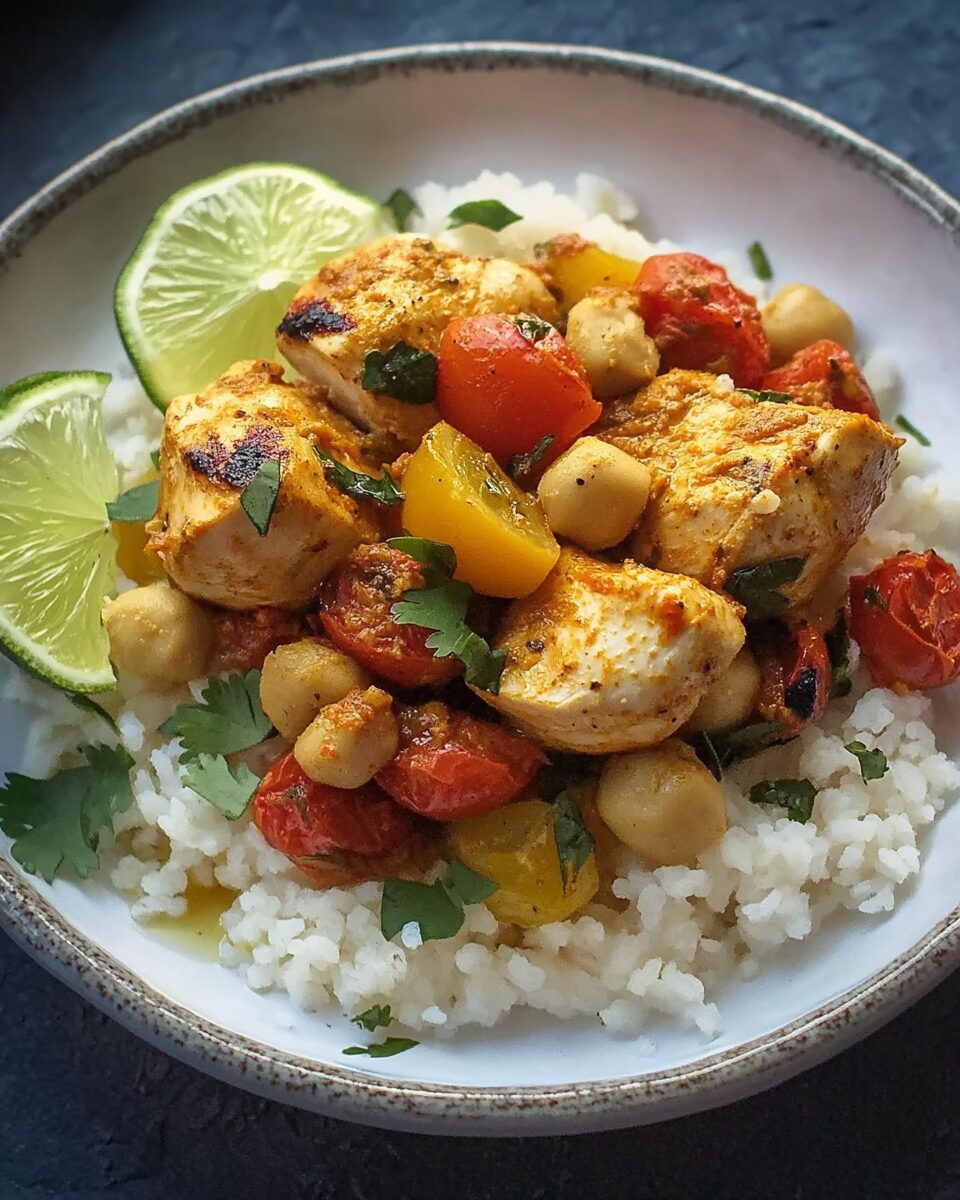Moroccan Chicken is a flavorful and aromatic dish that combines tender chicken with a blend of spices such as cumin, cinnamon, turmeric, and coriander. This dish reflects the vibrant and rich culinary heritage of Morocco, where spices are used to bring warmth and complexity to meals. Often served with couscous or flatbread, Moroccan Chicken makes for a hearty and comforting meal that is perfect for dinner gatherings or family meals.
Full Recipe:
Ingredients
- 1 whole chicken, cut into pieces
- 2 tablespoons olive oil
- 1 onion, finely chopped
- 2 garlic cloves, minced
- 1 tablespoon ground cumin
- 1 teaspoon ground turmeric
- 1 teaspoon ground cinnamon
- 1 teaspoon ground ginger
- 1/2 teaspoon ground coriander
- Salt and pepper, to taste
- 1 cup chicken broth
- 1/2 cup dried apricots, chopped
- 1/2 cup almonds, toasted
- 1 tablespoon honey
- Fresh cilantro, for garnish
Directions
- Heat olive oil in a large pot over medium heat. Add the chicken pieces and cook until browned on all sides, about 6-8 minutes.
- Remove the chicken from the pot and set it aside. Add the chopped onion and garlic to the pot, cooking until softened, about 3-4 minutes.
- Stir in the cumin, turmeric, cinnamon, ginger, and coriander. Cook for another minute until the spices are fragrant.
- Return the chicken to the pot and add the chicken broth. Bring to a simmer, cover, and cook for 30-35 minutes, or until the chicken is cooked through.
- Add the chopped apricots, toasted almonds, and honey to the pot. Stir well and cook for an additional 5 minutes.
- Garnish with fresh cilantro before serving.
Nutrients
Calories: 350
Total Fat: 20g
Saturated Fat: 2g
Cholesterol: 90mg
Sodium: 380mg
Total Carbohydrates: 23g
Dietary Fiber: 4g
Sugars: 17g
Protein: 22g
The Rich History of Moroccan Cuisine
Moroccan cuisine is influenced by a variety of cultures, including Arab, Berber, and Mediterranean, with the added influence of sub-Saharan African, Jewish, and European flavors. This fusion has resulted in a unique culinary identity that is reflected in many traditional dishes, and Moroccan Chicken is no exception.
The use of spices in Moroccan cooking is one of its most distinctive features. Spices such as cumin, cinnamon, ginger, and saffron are staples in Moroccan kitchens, and they are often combined in complex spice blends like ras el hanout, which is used in many Moroccan dishes, including chicken recipes. These spice blends not only add depth to the flavors but also have historical and cultural significance, symbolizing the complexity of Morocco’s trade routes and its rich history as a crossroads for cultures.
The introduction of sweet and savory combinations, such as the addition of dried fruits like apricots and raisins, is another hallmark of Moroccan cuisine. These elements help balance the bold flavors of spices and create a dish that is both satisfying and complex. Moroccan Chicken, with its use of spices and dried fruits, embodies these elements and offers a taste of Morocco’s culinary heritage in every bite.
What Makes Moroccan Chicken Unique?
The uniqueness of Moroccan Chicken lies in its flavor profile. Unlike many other chicken dishes, Moroccan Chicken incorporates a perfect balance of sweet and savory flavors, creating a symphony of tastes that dance on the palate. The combination of warming spices such as cinnamon, cumin, turmeric, and coriander gives the chicken its signature taste and aroma. These spices are not overwhelming; instead, they enhance the natural flavors of the chicken while adding depth and complexity.
The addition of dried apricots, almonds, and honey further elevates the dish by providing sweetness and texture. The apricots soften during the cooking process and release their natural sugars, which complement the savory spices perfectly. Toasted almonds add a crunchy contrast, creating a delightful texture that contrasts with the softness of the chicken and the fruit. The honey ties everything together by adding a touch of sweetness that balances the dish’s savory components.
The cooking method is also a defining feature of this dish. Moroccan Chicken is typically simmered slowly in a pot, allowing the flavors to meld together and infuse the chicken with all of the spices and sweetness. This slow cooking process ensures that the chicken remains tender and juicy, absorbing the complex flavors from the spices, broth, and fruits.
How to Serve Moroccan Chicken
Moroccan Chicken is often served as the centerpiece of a meal, paired with traditional side dishes that complement its rich and aromatic flavors. One of the most popular pairings is couscous, a light and fluffy grain that soaks up the flavorful broth from the chicken. The fluffy texture of couscous provides a perfect contrast to the tender chicken and adds a satisfying base to the dish.
In addition to couscous, Moroccan Chicken can also be served with flatbreads such as khobz, a traditional Moroccan bread. This bread is perfect for scooping up the sauce and enjoying every last bit of flavor. For those who prefer rice, a fragrant rice pilaf with spices like saffron or turmeric also makes an excellent accompaniment to the chicken.
Moroccan Chicken is typically garnished with fresh cilantro or parsley before serving, adding a burst of color and freshness that balances out the richness of the dish. A side of roasted vegetables, such as carrots, squash, or bell peppers, can add more color and texture, making the meal even more satisfying.
This dish is often enjoyed as part of a larger Moroccan feast, with multiple courses served family-style. Moroccan meals are meant to be shared, and Moroccan Chicken is no exception. Whether served for a family dinner or a special occasion, this dish is sure to create a memorable meal.
The Health Benefits of Moroccan Chicken
While Moroccan Chicken is a flavorful and indulgent dish, it also has some health benefits, thanks to its use of aromatic spices, lean chicken, and nutritious dried fruits and nuts.
Cumin: One of the key spices in Moroccan Chicken, cumin has been shown to aid digestion and improve metabolism. It’s also rich in antioxidants and has anti-inflammatory properties that can benefit overall health.
Turmeric: This vibrant yellow spice is not only responsible for the dish’s color but also provides a number of health benefits. Turmeric contains curcumin, a compound that has anti-inflammatory and antioxidant effects. Studies suggest that curcumin may help reduce the risk of chronic diseases like heart disease and cancer.
Cinnamon: Cinnamon is another common spice in Moroccan Chicken, and it offers several health benefits. It has been shown to help regulate blood sugar levels, making it an excellent addition for those with diabetes or anyone looking to maintain stable energy levels throughout the day.
Almonds: The toasted almonds in this dish provide a crunchy texture and a dose of healthy fats. Almonds are rich in monounsaturated fats, which are heart-healthy and can help lower cholesterol levels. They also provide fiber, protein, and important vitamins and minerals like vitamin E, magnesium, and calcium.
Apricots: The dried apricots in this dish add natural sweetness and provide several health benefits. They are a good source of fiber, which aids digestion and helps keep you full for longer. Apricots are also rich in vitamins A and C, both of which support immune health and promote healthy skin.
While Moroccan Chicken is a flavorful and satisfying dish, it’s important to enjoy it in moderation, especially when pairing it with sides like couscous or rice. For a healthier version, you can reduce the amount of honey or use a lower-sodium broth to cut down on sugar and salt.
Modern Variations of Moroccan Chicken
While the traditional recipe for Moroccan Chicken has been passed down through generations, modern cooks have found ways to put their own spin on the dish. Some variations of Moroccan Chicken include adding different vegetables like eggplant, zucchini, or tomatoes, which enhance the flavor and nutritional value of the dish.
For a healthier twist, you could substitute the chicken with lean cuts of turkey or use boneless, skinless chicken breasts instead of whole chicken pieces. If you’re looking to make the dish vegetarian, you could replace the chicken with chickpeas or tofu, which will absorb the spices and offer a satisfying plant-based alternative.
Another variation of Moroccan Chicken is to cook it in a slow cooker or Instant Pot for convenience. These methods allow you to set the dish and let it cook while you go about your day, resulting in a tender, flavorful chicken without much effort.
Conclusion
Moroccan Chicken is a delicious and aromatic dish that offers a taste of North African culinary traditions. With its combination of savory spices, sweet dried fruits, and crunchy nuts, this dish provides a well-balanced flavor profile that is sure to delight your taste buds. The rich history and cultural influences behind Moroccan cuisine make it a dish worth savoring, whether you’re cooking for a special occasion or just looking to enjoy a comforting meal at home.
Not only is Moroccan Chicken a feast for the senses, but it also offers numerous health benefits thanks to its use of nutritious ingredients like cumin, turmeric, almonds, and apricots. Whether you’re serving it for a holiday dinner, a family gathering, or just as a weeknight meal, Moroccan Chicken is sure to impress.

